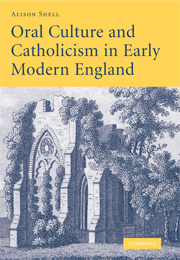Book contents
- Frontmatter
- Contents
- List of illustrations
- Preface
- Note on conventions
- List of abbreviations
- Introduction
- 1 Abbey ruins, sacrilege narratives and the Gothic imagination
- 2 Anti-popery and the supernatural
- 3 Answering back: orality and controversy
- 4 Martyrs and confessors in oral culture
- Conclusion: orality, tradition and truth
- Notes
- Index
Conclusion: orality, tradition and truth
Published online by Cambridge University Press: 22 September 2009
- Frontmatter
- Contents
- List of illustrations
- Preface
- Note on conventions
- List of abbreviations
- Introduction
- 1 Abbey ruins, sacrilege narratives and the Gothic imagination
- 2 Anti-popery and the supernatural
- 3 Answering back: orality and controversy
- 4 Martyrs and confessors in oral culture
- Conclusion: orality, tradition and truth
- Notes
- Index
Summary
To repeat Joseph Hall's challenge, ‘… as for oral Traditions, what certainty can there be in them?’ Whether one can prove the authenticity of oral tradition is not a question specific to religious discourse, in early modern England or at any other time. But the questions thrown up by the Reformation about its reliability show how, in the days before the academy was secularised, it was theological debate which often set the pace on questions hermeneutics. Religious polemic is an unsurpassed means of clarifying ideas, and these ideas, in turn, often develop well beyond their original impetus. If the notion of oral tradition began life as a deliberately partial definition, not least because the passage ignores the importance of nonscriptural written sources in Catholic concepts of tradition, it has become an entirely different endeavour since Hall's time. Hall would have been surprised to see how his contemptuous phrase has metamorphosed, both within common usage, and within the speech of a discipline concerned, where possible, with recovering truth through oral means.
Even so, the title of this book is partly a tribute to Hall for recognising the close relationship between Catholicism and ideas of oral tradition, and for posing a challenge with which any exponent of orally transmitted material has to engage – whether in a direct or an oblique manner.
- Type
- Chapter
- Information
- Oral Culture and Catholicism in Early Modern England , pp. 149 - 169Publisher: Cambridge University PressPrint publication year: 2007
- 1
- Cited by



